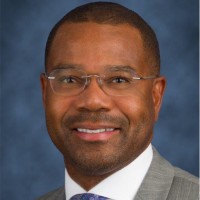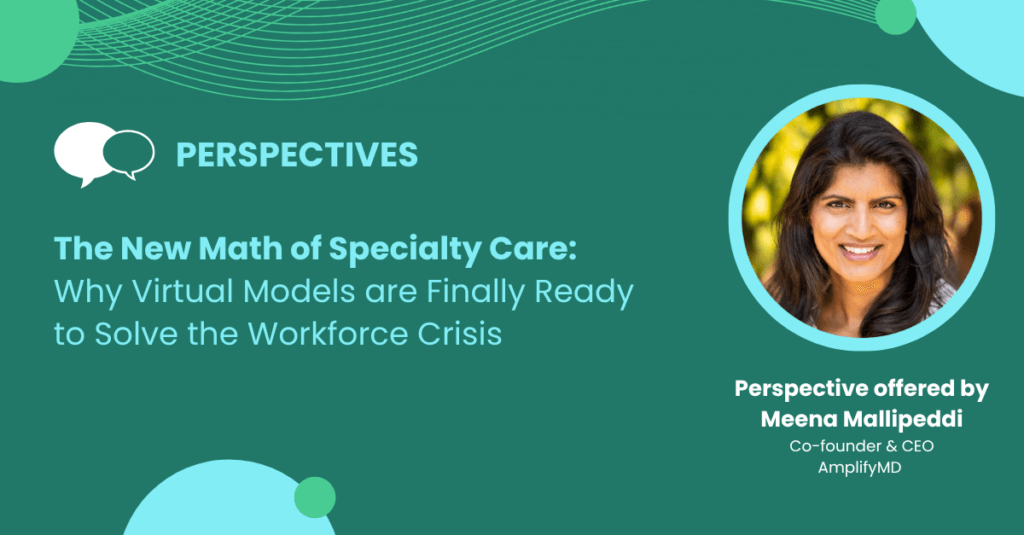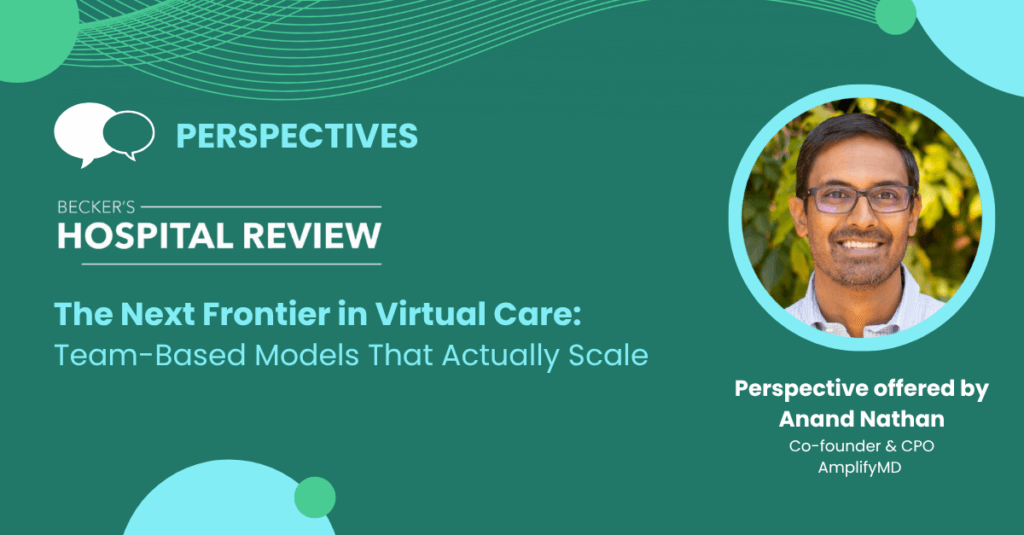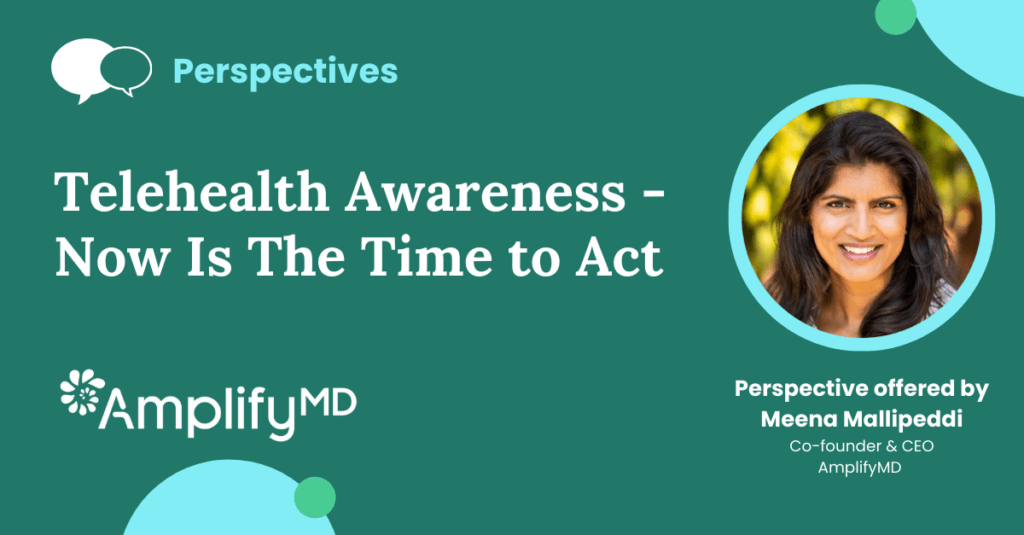AmplifyMD’s CEO, Meena Mallipeddi, regularly speaks with innovative healthcare leaders on her podcast, The Seamless Connection. This Q&A comes from her conversation with O’Neil J. Pyke, MD, CMO, Jackson North, Jackson Health System. (The podcast conversation has been edited and condensed.)

O’Neil Pyke
CMO Jackson North
Jackson Healthcare
What brought you to medicine?
I always wanted to be a doctor. In fact, I told my mom at eight years old that I shouldn’t do yard work because I needed to save my hands for surgery. And she jokes with me now because I have two siblings who are surgeons, and I’m not. I love the practice of internal medicine as I think that was the deepest I could get into understanding and caring for adults. And hospital medicine, which was a field that was emerging at the time, has really become part of me – it’s become my identity for the last 20-plus years.
Tell us a little bit about yourself and your journey.
When I was a healthcare consultant, I had the privilege of being invited to many institutions across the country to examine their hospital medicine area, which gave me a wealth of knowledge through that experience. I love working with hospitals to improve patient flow and physician leadership training. My passion is guiding providers along the cultural humility continuum in this ever-changing and diverse healthcare landscape.
How do you define health equity?
From a clinician’s vantage point, health inequity in our society means someone is lacking the basic things to provide for their basic health – food insecurity, housing, or health access issues. Simple things like having clean drinking water to stay hydrated. Not just available resources but access to those resources.
What strategies can healthcare providers adopt to promote cultural humility in their practice and navigate the diverse healthcare landscape effectively?
At Jackson, we have several social programs and channels to offer resources to patients who suffer from health inequity. We have embarked on a larger mission in looking at how we can actually reach out to all communities. I think COVID advanced some of those social resources and enabled us to meet the people where they are and impact them before they get sick, not only with COVID but with things like high blood pressure. And we do a lot of clinic work with churches and community centers to actually just talk and meet patients. It’s a heavy lift, but we see it as a marathon.
How can healthcare organizations address health disparities and contribute to achieving better health equity?
I think our community, like others, had a healthy skepticism for any kind of resources that’d been afforded to them. What we have done is lean on trusted leaders within the community and let them be the voice that resonates with the people who trust them. I go in with the mindset that I need to gain that trust when I walk into a room. I want to make sure I engage with them with proper eye contact, listen to them, and spend time with them because, at the end of the day, I’m not just the physician who prescribes and hopes they respond to it, I feel deeply that my job is going beyond that to ensure they have some chance of hearing, understanding and following those things we’re advising. We want to improve that person’s journey in whatever way we can and support them and their family however we can.
What steps can people take to prioritize and take ownership of their health?
One thing I advise patients to always do is find a trusted individual in their circle to take along to their doctor’s appointments. Someone who can listen and pay attention who is not engaged in that encounter.
The other thing that I would say is to prepare for your actual visits. Before going to the doctor, you have to own your own health. If you are hypertensive, get your blood pressure checked often. So you come to the physician prepared to say that while today my blood pressure is 160 over 90, these are my blood pressure readings over that last month.
Also, be prepared by writing down your questions about what you’ve been experiencing. And make sure before you leave that doctor’s appointment that your questions are answered because if you are prepared and a doctor sees that you are really engaged in your own health, they are compelled to pay attention.
What initiatives have you found effective in promoting health awareness and engagement in clinical and community settings?
I have roundtable talks about cultural humility and health care and what that looks like in an actionable sense. Because it’s one thing to actually say cultural humility. But how do you put that into action?
Providers need to explain why patients should be compliant with their medications or their diets. And when I’m doing it, I have to be present. If I need to overcome linguistic barriers, I need to get a person who can help me translate. When you’re prepared, you can be more efficient and engage meaningfully, which means you listen and then document, not type feverishly on a keyboard while pretending to be listening.
What patients should demand is someone who is paying attention to them, someone who comes to your bedside or appointment, prepared to care for you, to help you on your journey to getting better.
What’s next for you?
I’m going to be embarking on more teaching. We have a very large academic footprint in Miami-Dade, and bringing those resources to Jackson North is very exciting because wherever you see academics, it elevates the care that we deliver.
I came to Jackson Health purposefully. One of the things that I felt like I was missing was being exactly where I am now. I’m in a community that is somewhat marginalized on many levels, in a public hospital. For me, this is the leg where I’m holding the baton and leading the clinical care at Jackson North. My goal is to reset a foundation for a clearer understanding of best practices knowing that we have limited resources. We have to purposely and critically think about why we’re doing what we’re doing.
Listen to Dr. Pyke’s entire conversation with Meena Mallipeddi on Episode #16 of The Seamless Connection podcast hosted by Slice of Healthcare.





